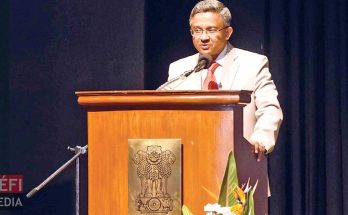 Before India’s Prime Minister Narendra Modi went to Brazil for his first major international summit, the sixth annual BRICS summit, he put forward his vision that the vitality of the BRICS group would cut across the geographical and ideological divides of not only the five countries of the group but also of the global economy.
Before India’s Prime Minister Narendra Modi went to Brazil for his first major international summit, the sixth annual BRICS summit, he put forward his vision that the vitality of the BRICS group would cut across the geographical and ideological divides of not only the five countries of the group but also of the global economy.
The BRICS countries, once called the growth engines of the global economy, have shown uneven growth in recent years. The West, meanwhile, is looking at new avenues to bring back its tumbling economic clout and there has been a sudden surge of mega free trade agreements (FTAs) such as the TTIP (Transatlantic Trade and Investment Partnership) and the TPP (Trans-Pacific Partnership). These new agreements, with tougher labour and environmental standards and next generation rules for trade and investment could result in disguised protectionism aimed at restricting imports from the emerging economies.Bilateral economic tensions have also added to the difficulties the group is facing. So, how can BRICS cement its status as a credible economic bloc?
The US and the EU are preparing to enter into the largest trade deal in history — the TTIP — an arrangement which would complement the other gigantic US-led trade deal, the TPP. Yet, there is a striking absence from the deal of the countries which emerged as the more assertive leaders after the 2008 global Financial crisis — the BRICS. Despite the economic side effects of the 2008 financial crisis and the Eurozone crisis, the BRICS — as an organisation — is growing more relevant and increasingly institutionalised. Economic growth rates continue to outpace the rest of the developing world. According to the UNDP, Brazil, China and India’s combined GDP will be greater than the combined GDP of the US, the UK, Canada, France, Germany and Italy by 2020.
It will be important for the BRICS to consolidate their global position. But the TTIP is not only an attempt to forge a trade deal aimed at market liberalisation and eliminating trade barriers between the US and the EU. It essentially marks the latest strategy to preserve the rules on international trade and thus continue Western domination over international governance structures.
There are conflicting predictions on the effect that the TTIP would have on non-TTIP countries. One recent study speculates a collective gain of approximately 2.4 billion (US$4.1 billion) for non-TTIP low-income countries. Another report sees a significant loss of market share for developing countries as a result of the FTA. The study speculates that trade between Germany and BRICS would drop by around 10 per cent while US-BRICS trade would decline by around 30 per cent.
In such a scenario, the BRICS countries have a choice. Either pursue a BRICS FTA to enhance cooperation, enabling BRICS to counter marginalisation by the TTIP, or maintain the status quo. The TTIP does not pose a significant threat to the BRICS and has the potential to have a positive spillover effect on other countries. The BRICS could therefore take an approach of passive engagement. While not directly attempting to balance the TTIP, the BRICS countries could intensify their efforts at closer cooperation and consolidate their position as a powerful trade bloc.
The biggest impediment to the BRICS becoming a cohesive force is bilateral economic tensions. China, for one, continues to account for the lion’s share of intra-BRICS trade. And currency manipulation by China remains another sticking point. Furthermore, barriers to trade and investment need to be removed. Inadequate infrastructure and framework conditions like cumbersome trade facilitation — excessive logistic costs in particular — and other non-tariff barriers in the form of technical measures and sanitary and phyto-sanitary measures are proving stumbling blocks, the negative effects of which far exceed those of tariff barriers.
The establishment of the proposed BRICS development bank would, to a great extent, address infrastructure funding shortages in these countries, something which Prime Minister Modi also spoke of prior to his departure for the summit.
With their common ‘anti-interventionist’ policy, the bloc has the potential to rival Western domination in Africa. The less-developed economies of Africa may also feel more comfortable associating with the developing nations of the BRICS for historical reasons and because of the ideal of multilateralism that the BRICS stand for. The 2013 BRICS Summit in Durban was a declaration of a lasting, symbiotic relationship with the African continent — Africa offers a large, diverse market to the BRICS in the form of one billion consumers and a growing middle class.
Following the Durban example, this year all the South American heads of state have been invited to the BRICS Summit — attributing a perceptible geopolitical colour to the bloc which is widely seen just as an ‘economic bloc’.
BRICS countries have been taking small steps towards increasing cooperation in the wake of the rapidly changing global economy, especially after the 2008 financial crisis. Their common concerns on growth and development, and their resolve to lessen their dependence on existing Western-led financial structures, cement this partnership. More importantly, the bold idea of a BRICS development bank and a common monetary unit further exhibit their intention to drive the transition from unipolar global financial governance to a multipolar system — a system that amplifies the voice of the emerging economies and reflects the reality of the global economy.
The views expressed in this article are solely those of the authors.
(Courtesy: ORF)
Author Profile
- India Writes Network (www.indiawrites.org) is an emerging think tank and a media-publishing company focused on international affairs & the India Story. Centre for Global India Insights is the research arm of India Writes Network. To subscribe to India and the World, write to editor@indiawrites.org. A venture of TGII Media Private Limited, a leading media, publishing and consultancy company, IWN has carved a niche for balanced and exhaustive reporting and analysis of international affairs. Eminent personalities, politicians, diplomats, authors, strategy gurus and news-makers have contributed to India Writes Network, as also “India and the World,” a magazine focused on global affairs.
Latest entries
 DiplomacyApril 10, 2024Diplomat-author Lakshmi Puri pitches for women power at LSR
DiplomacyApril 10, 2024Diplomat-author Lakshmi Puri pitches for women power at LSR India and the WorldApril 6, 2024UN envoy pitches to take India’s solutions to the world stage
India and the WorldApril 6, 2024UN envoy pitches to take India’s solutions to the world stage CultureApril 5, 2024Youth in Diplomacy: Making it Matter with LSR Model UN 2024
CultureApril 5, 2024Youth in Diplomacy: Making it Matter with LSR Model UN 2024 India and the WorldMarch 28, 2024India to China: Normalization of troops deployment imperative for restoring ties
India and the WorldMarch 28, 2024India to China: Normalization of troops deployment imperative for restoring ties







